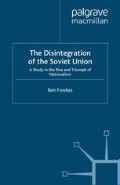Abstract
The ‘great change’ of 1929, the move to policies of rapid industrialization and collectivization, was intended to embrace the whole of Soviet life and not to be limited to the economic sphere. It was therefore accompanied by a ‘cultural revolution’ intended to destroy the old bourgeois intelligentsia and culture and to put in their place a new culture, socialist and proletarian. This culture would be in large part created by newly educated workers and peasants who had risen from the ranks. There was no reason why non-Russians could not take part in this process.1 Accordingly, the cultural revolution of the early 1930s was presented as, not the reverse of the policy of indigenization which prevailed in the 1920s, but its more effective continuation. To some extent this was true: the big campaign against illiteracy mounted after 1929 generally had the result of strengthening the position of the local languages in the union republics, and the published statistics show that the indigenization of the party and state apparatus continued for several more years.2 But the ultimate consequence of the ‘great change’ was to worsen the situation of the non-Russians, if we examine the actual impact of the new policies. As far as the periphery was concerned the move towards rapid industrialization was also a move towards greater intervention by the centre.
Access this chapter
Tax calculation will be finalised at checkout
Purchases are for personal use only
Preview
Unable to display preview. Download preview PDF.
Notes
H. Bräker, Kommunismus und Weltreligionen Asiens. Band 1,1: Kommunismus und Islam (Tübingen, 1969), pp. 111–14.
R. Conquest, The Harvest of Sorrow (London, 1986), pp. 299–307.
A. Bogdanov, ‘Kolkhoznoe stroitel’stvo v natsrespublikakh i oblastiakh’, RN, 1931, 1, pp. 55–6.
S. Dimanshtein, Iatoricheskie resheniia XVII partkonferentsii’, RN, 3, 1932, p. 11.
M. Heller and A. Nekrich, Utopia in Power (London, 1986), p. 265.
M. Haghayeghi, Islam and Politics in Central Asia (Manchester, 1995), p. 23.
E. Oberländer (ed.), Sowjetpatriotismus and Geschichte. Dokumentation, (Cologne, 1967), pp. 58–9.
A.M. Nekrich, The Punished Peoples: the Deportation and Fate of Soviet Minorities at the end of the Second World War, (New York, 1978), p. 112.
C. Thomson, The Singing Revolution (London, 1992), p. 42.
M. Culleme Bown, ‘Painting in the Non-Russian Republics’, in M. Culleme Bown and B. Taylor (eds), Art of the Soviets (Manchester, 1993), p. 149.
N. Karimov, ‘Exposing the Murderer of Alpamysh’, in H.B. Paksoy (ed.), Central Asian Reader. The Rediscovery of History (Armonk, NY, 1994), pp. 51–2.
V.M. Zhirmunskii, Tiurkskii Geroicheskii Epos (Leningrad, 1974), p. 25.
C. Mouradian, ‘Problèmes linguistiques et culturels en Arménie’, Slovo (Paris), 5, 1984, p. 123.
B. Gafurov, ‘Uspekhi natsional’noi politiki KPSS’, Kommunist, 11, August 1958, pp. 10–24.
J. Dreifelds, ‘Latvian National Demands’, in G.W. Simmonds (ed.), Nationalism in the USSR and Eastern Europe in the Era of Brezhnev and Kosygin, (Detroit, 1977), p. 138;
R. Misiunas and R. Taagepera, The Baltic States: Years of Dependence 1940–1991 (London, 1993), pp. 134–41.
B. Silver, ‘The Status of National Minority Languages in Soviet Education. An Assessment of Recent Changes’, Soviet Studies, 26, 1974, p. 31.
M.A. Zotov and G.N. Shanshiev, ‘Protiv narushenii leninskoi printsipa partiinosti v nauke’, Voprosy Istorii KPSS, 4, 1958, p. 176.
C. Saikowski and L. Gruliow (eds), Current Soviet Policies IV: The Documentary Record of the 22nd Party Congress of the CPSU (New York, 1962), pp. 103–4.
S.M. Abramzon, ‘Proshloe i nastoiashchee Kirgizskikh Shakhterov KyzylKiia’, Sovetskaia Etnografiia (1954), 4, p. 74.
G. Hodnett, Leadership in the Soviet National Republics. A Quantitative Study of Recruitment Policy, (Oakville, Ontario, 1978), p. 377.
V. Zaslaysky, The Neo-Stalinist State, (Brighton, 1982), p. 93.
S.I. Bruk and V.M. Kabuzan, ‘Dinamika chislennosti i rasseleniia russkikh posle Velikoi Oktiabrskoi sotsialisticheskoi revoliutsii’, Sovetskaia Etnografiia, 5, 1982, p. 13.
L.N. Terent’eva, ‘Ethnic Self-Identification by Adolescents in Ethnically Mixed Families’, Soviet Sociology, 1, summer 1973, pp. 34–51.
M.S. Dzhunusov, ‘Sblizhenie natsii v usloviakh razvitogo sotsializma’, Sotsiologicheskie issledovaniia, 4, 1976, pp. 47–8.
E. Kogan, ‘Vypolnenie piatiletnogo plana po natsionalnym respublikam’, RN, 6, 1931, p. 47.
V. Holubykhny, ‘Some Economic Aspects of Relations among the Soviet Republics’, in E.Goldhagen (ed.), Ethnic Minorities in the Soviet Union (New York, 1968), p. 73.
Author information
Authors and Affiliations
Copyright information
© 1997 Ben Fowkes
About this chapter
Cite this chapter
Fowkes, B. (1997). Stalin and After: The Interplay of Modernization and Russification. In: The Disintegration of the Soviet Union. Palgrave Macmillan, London. https://doi.org/10.1057/9780230377462_3
Download citation
DOI: https://doi.org/10.1057/9780230377462_3
Publisher Name: Palgrave Macmillan, London
Print ISBN: 978-1-349-39252-0
Online ISBN: 978-0-230-37746-2
eBook Packages: Palgrave Political & Intern. Studies CollectionPolitical Science and International Studies (R0)

